May 7, 2017
by Carole Zangari -
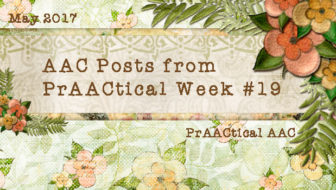
Hope your Better Hearing and Speech Month is off to a great start! Need ideas for things to do, materials to download, or information to share? Check out our first post in this list. We love the 2017 theme – Communication: The Key to Connection. Monday: It’s PrAACtically Better Hearing & Speech Month Wednesday: Video of the Week: AAC Assessment with a Formal Test Thursday: PrAACtical Research: Profiles of Students with Significant Cognitive Disabilities
Filed under: PrAACtical Thinking
Tagged With: summary post
May 4, 2017
by Carole Zangari -
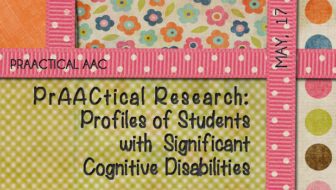
In today’s post, we welcome Dr. Kathy Howery who will be appearing here periodically to review some of the AAC research that is published in journals around the world. Kathy joins us from Alberta, Canada, and has worked in the field of assistive technology and special education for over three decades. Most recently she has completed her doctoral studies where she used phenomenological methods to seek understanding of the lived experience of speaking with/through a speech generating device. Kathy is currently working as consultant to schools and school districts across Alberta focusing primarily on children and youth with complex communication needs. In this first post, she helps us understand a study by Drs. Karen Erickson and Lori Geist published in the AAC journal last year. Enjoy! ::::::::::::::::::::::::::::::::::::::::::::::::::::::::::::::::::::::::::::::: Erickson, K. A. & Geist, L. A. (2016). The profiles of students with significant cognitive disabilities and complex communication needs. Augmentative and Alternative Communication,... [Read More...]
Filed under: Featured Posts, PrAACtical Thinking
May 1, 2017
by Carole Zangari -

Here in the US, today is the start of Better Hearing and Speech Month (#BHSM).This year’s theme, Communication-The Key to Connection, has lots of prAACtical implications. The American Speech Language Hearing Association (ASHA) sponsors activities and shares resources every year, encouraging us to build awareness of communication and the professionals who serve those with speech, language, hearing, and swallowing disorders. For those of us interested in AAC, it’s also an opportunity to help our fellow professionals better understand the needs of people with complex communication needs. There are lots of ways that you can get involved to support AAC and spread the word about effective AAC practices to colleagues and families. Click on the image below to learn about what the ASHA is doing and to get a few ideas to get you started. Let’s make an impact.
Filed under: Featured Posts, PrAACtical Thinking
Tagged With: ASHA, Better Hearing and Speech Month, BHSM
April 27, 2017
by Carole Zangari -
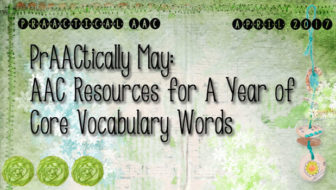
It is just about time to flip the calendar to a new page, and that means it’s time for a new set of core words to model, elicit, and practice. In this post, we have a number of resources and an announcement (**scroll to the bottom**) for those who’ve tried their hand at implementation. Thanks to all who’ve reached out with questions, comments, and words of appreciation for the Year of Core Vocabulary series. Here are some helpful resources for those who are using the words in Set 1 ( 2013 Year of Core Words) or Set 2 (Another Year of Core Words). If you are contemplating this approach, feel free to jump in at any time. The best time to start (or re-start) is right now. Don’t worry about retracing steps, or not ‘doing it right.’ The best way to get better at core vocabulary instruction is just to... [Read More...]
Filed under: Featured Posts, PrAACtical Thinking
Tagged With: download, resources, Year of Core Vocabulary
April 24, 2017
by Carole Zangari -
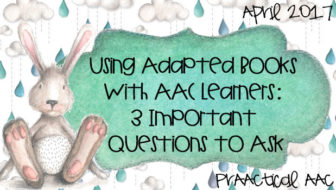
We’re seeing a big increase in the number of families and professionals who are prioritizing literacy instruction for people with AAC needs, and that makes us VERY happy. In some cases, families, teachers, and therapists are using adapted books in their shared reading activities and making them available for self-selected reading, too. There are lots of ways to adapt books, though, and not every adaptation is appropriate for an individual who uses or is learning AAC. In this post, we talk about some of the things to consider when making decisions about adapted books. The term ‘adapted book’ refers to a book that was altered in some fashion to make it more accessible to people with disabilities. There are different ways of modifying books including: Simplifying or revising the text, Adding AAC symbols to the text, Changing the format (e.g., cutting it apart, binding it at the top, and reassembling,... [Read More...]
Filed under: Featured Posts, PrAACtical Thinking
Tagged With: adapted books, Books, literacy, reading
April 17, 2017
by Carole Zangari -
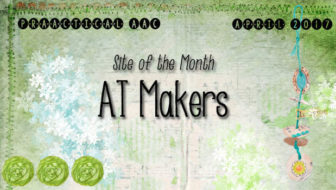
We’ve been writing about the Makers Movement for awhile, and couldn’t be happier with the way that the AT community has embraced it. When we posted a video about one of their DIY switch mount projects a few months ago, we were impressed by the number of you who asked for more. In today’s post, we dig deeper into this area by highlighting the AT Makers site. The AT Makers site aims to be a meeting place for AT specialists, Science Technology Engineering and Math (STEM) and Robotics Clubs/Teams, and engineers. Here are the highlights: Glossary: DIY AT projects sometimes involve people from various backgrounds working together to solve problems. This handy glossary helps us speak the same language. Tutorials: The site currently has project plans, supply lists, videos, and directions for AT-related projects that it offers to the global community. For now, there are just a handful of projects... [Read More...]
Filed under: Featured Posts, PrAACtical Thinking
Tagged With: AT, DIY
April 16, 2017
by Carole Zangari -
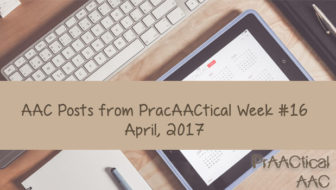
Hope you had a meaningful holiday. Here are some posts you may have missed while you were enjoying the company of friends and family. Monday: PrAACtical Resources: 10 Things You May Not Know About AAC Wednesday: Video of the Week: TELL ME – AAC in the Preschool Classroom Thursday: PrAACtical Perspectives: Randomness and AAC
Filed under: PrAACtical Thinking
Tagged With: summary post
April 13, 2017
by Carole Zangari -
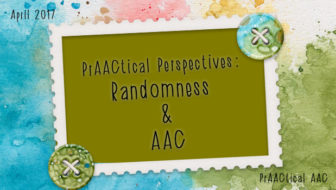
It’s a healthy sign when practitioners in any field examine their beliefs, reflect on their own practices, and revisit previously held assumptions. In this post, veteran SLP Alicia Garcia challenges us to think about some important questions. Do we hold people who use AAC to standards that are different from their speaking peers? How does that impact them? What, if any, adjustments in our thinking should be made to help them flourish? It’s a great day for us to slow down and think through questions like these, and Alicia’s guest post helps us do just that. The Curse of the Random Thought in AAC Situation: Young verbal children playing in a sand pit Child 1: My dad’s truck broke Child 2: Oh… my mom has a blue car and she’s coming over later Child 3: … I had a big candy bar all by myself… Communication is a messy... [Read More...]
Filed under: Featured Posts, PrAACtical Thinking
Tagged With: reflective practices, self-reflection
April 10, 2017
by Carole Zangari -

Almost anyone who has done AAC trainings, consultations, and evaluations has spent at least part of their time educating others and busting myths about AAC principles, practices, and expected outcomes. We’re always on the lookout for easy-to-use resources that help us make our points and leave the participants with a meaningful way to remember the main points of our discussion. Today we’re revisiting a simple 1-page resource that can be used as a supplemental handout in trainings, shared with colleagues and families, and displayed in a classroom or office. Click on the image below to download a printable copy.
Filed under: Featured Posts, PrAACtical Thinking
Tagged With: downloads, reseources
April 6, 2017
by Carole Zangari -
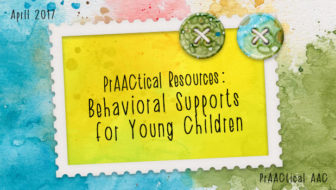
One of the biggest stressors for therapists and educators who work with AAC is dealing with challenging behavior. In today’s post, we share a wonderful set of resources on positive approaches to preventing, minimizing, and de-escalating instances of challenging behavior. The Technical Assistance Center of Social Emotional Intervention for Young Children produced a number of resources that are available on their website here. Topics include: Tips and forms for getting started Using a Buddy System Teacher tools Turtle Technique Visual supports Using scripts Circle time tips Dealing with feelings Strategies for families to use at home There is also a helpful Tool Kit that can be accessed via the image below.
Filed under: Featured Posts, PrAACtical Thinking
Tagged With: behavior, positive behavior supports, preschool









